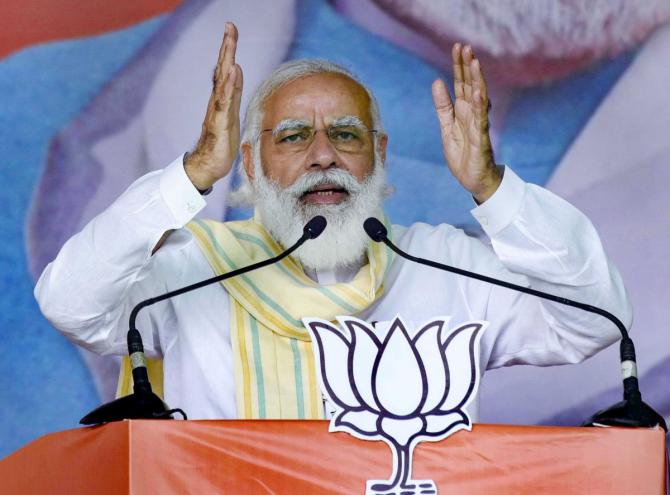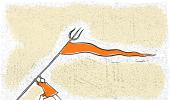'The propagation of an absolutist narrative that shuts down any dissent is dangerous, irresponsible, and unbecoming of India's proud democracy.'
'The government must do better.'

The latest book by Dr Shashi Tharoor, the Congress member of Parliament from Thiruvananthapuram, is The Battle of Belonging: On Nationalism, Patriotism and What it means to be an Indian.
Dr Tharoor has dedicated the book to his twin sons Ishan and Kanishk who have grappled with issues of nationalism in their lives and work.
"The ruling party's immense control over the media and other independent institutions, plus its relentless use of social media, have created a narrative in which the Bharatiya Janata Party's message is overpowering, shaping a hegemonic, narrow-minded idea of India, in which any dissent immediately makes one a so-called anti-national," Dr Tharoor tells Shobha Warrier/Rediff.com.
You have titled your book The Battle of Belonging. Do human beings have to battle it out to belong? If it is so, is it not disturbing?
Do you think belonging should come automatically, and a person should not be worried about this facet of his/her existence?
How interconnected are the sense of belonging, nationalism and patriotism?
The sort of nationalism I advocate in the book is 'civic nationalism' -- that is, a voluntary sense of belonging wrought by a feeling of inclusivity, anchored in equal treatment, constitutions, and institutions, not in religion, ethnicity, or other markers of identity.
This stands in marked opposition to 'ethno-religious nationalism', which is exclusionary and often dangerous, and is rooted in an absolutist approach to determining who belongs to a country and who does not.
To me, patriotism is about loving your country because it is your own, because you feel you belong there and that it belongs to you. It has nothing to do with your country being perfect, nor with demanding absolute allegiance to your country without permitting any dissent.
As I write in the book, a patriot is prepared to die for his country, while a nationalist is ready to kill for his state: Two very different concepts.
We must reclaim the idea of nationalism as a love of country arising from a love of social justice, tolerance, and inclusivity: That is the only way that we can ensure that no Indian feels worried about their sense of belonging.
Patriotism is a sentiment that a person should feel in their inner-most being: It is not something that we can force on anyone.
You write in the chapter, The Prism of Identity, 'Since history is so indispensable to nationalism, it can (and often must) be reconstructed and reinterpreted to serve the nationalist project.'
If that is so, can we not interpret the history of different parts of India as divergent, and hence the idea of nationalism can also be different for people from different geographical locations?
India has a proud tradition of regional culture and history, and local culture will doubtless feed into the conception of how people view themselves and their country.
However, I have little doubt that Indians see themselves as Indians above all: As I say in the book, our incomparable diversity means that any member of a so-called majority community can find themselves in the minority quite quickly by traveling just a short distance.
The civic nationalism I argue for relies on a basis of institutions and laws to create a sense of belonging: This means that it is not constricted to any one region, religion, or ethnicity, but upholds and defends the rights of all Indians. Herein lies its strength, and that is why I am sure that it will prevail.

From the time when a Rabindranath Tagore could say, 'India has never had a real sense of nationalism', we have reached a situation where a person is labelled anti-national if s/he questions the ruling dispensation.
Are we, like Tagore said, 'controlled and manipulated by those in power'
If so, what could be the repercussions?
The ruling party's immense control over the media and other independent institutions, plus its relentless use of social media, have created a narrative in which the Bharatiya Janata Party's message is overpowering, shaping a hegemonic, narrow-minded idea of India, in which any dissent immediately makes one a so-called anti-national.
We must be very careful in drawing a distinction between the Indian government and India: To oppose the BJP, or indeed any party, does not mean one is unpatriotic.
Indeed, nothing is more patriotic than speaking out against injustice, regardless of who is meting it out.
The propagation of an absolutist narrative that shuts down any dissent is dangerous, irresponsible, and unbecoming of India's proud democracy. The government must do better.
When globalisation happened, it was believed that we would see more global citizens. You quote Arnold Toynbee in your book, 'Every human being would belong to a world society, a world state and a world city.'
But what we see today is building of walls between nations and creating artificial barriers to separate people.
Why do you think political leaders clamouring for protectionism and division are becoming popular, like a Donald Trump?
I have argued that we may be entering a period of de-globalisation.
The pandemic has only exacerbated pre-existing concerns about immigration, global trade, and cosmopolitanism.
This has encouraged some world leaders to turn inwards, to reject multilateralism and create barriers between nations, shaken by the apparent weakness of the international order.
In an increasingly complex world, cutting oneself off may give the illusion of safer territory, which may explain the rise of isolationist leaders like Donald Trump and others. However, it is just that -- an illusion.
I have long advocated for multilateral engagement at institutions like the UN, where I spent 29 years, as it is the greatest force for prosperity and peace: The world is a safer place when countries engage with one another rather than sealing themselves off.










